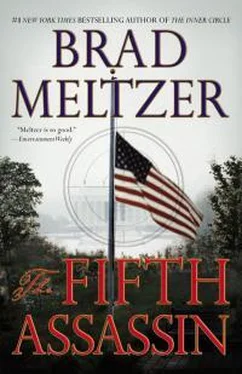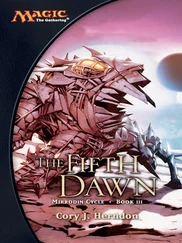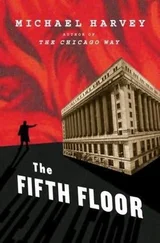I try to say something, but the only thing I can think of is just how much I don’t know this person anymore.
As Marshall continues steering the curve of the ramp, I try to picture the chubby kid with glasses from the treehouse. He’s not there. Today, the new Marshall’s posture is perfect, his shoulders square and unmoving. Even through his wool peacoat, I can see he’s compact, but all muscle. And somehow, there’s an ease about him, like a poker player who already knows the order of all the cards in the deck.
The thing is, as I notice his flat grin, something tells me that even if he didn’t know the order of the cards, he’d still be just as confident. No matter how much I was trying to surprise Marshall, it feels like he always knew I was coming.
“So how long have you lived here?”
Marshall stares straight ahead.
I’ve lived in Washington long enough to know what people do with silence. The CIA uses it as an interrogation technique, knowing that the longer you stay quiet, the faster you get people to talk. Reporters do the same. So if that’s the game Marshall’s playing, he’s about to learn that there’s no one more patient, or more comfortable in their own silence, than an archivist.
My ears pop as the ramp dumps us on the fifth level underground. As we pull into one of the many open parking spots, I don’t know why he took us down this far. Whoever else is in this building, most of them are gone.
Still silent, Marshall hops out, his pale, bumpy face peering back at me through the car’s front window. I follow him in silence as he shoves open a red metal fire door, and we enter a fluorescent-lit concrete room with a dull metal elevator. He’s got his back to me, but now that we’re both standing, I see he’s shorter than I am.
I remember him always being a few inches taller. It messes with the perspective of my memories, like when you go home and see how tiny your childhood room looks.
“How did you know I was looking for you?” I ask as the doors of the elevator stretch wide.
He doesn’t answer as we step inside. He waves his hand in front of the small black rectangle that’s set just above all the elevator’s call buttons. He’s got a key fob in his hand that allows access to the building.
The button for the twelfth floor lights up automatically, and we rise quickly.
“Marsh, I asked you a—”
“I go by Marshall now,” he interrupts, forcing his grin back into place.
“Marshall,” I correct myself, making note of the sore spot. “Listen, Marshall—I appreciate the Clint Eastwood silent thing you’ve got going, but c’mon… how often do you get drop-in visits from people you haven’t seen since puberty?”
He laughs at that one, making the waxy skin on his neck wriggle.
His peacoat is open now. I notice how his burns continue down his neck, into the collar of his pristine white dress shirt. Is he burned all over his body?
I look down at his hands, and for the first time realize he’s wearing gloves. A small pool of sweat fills the dimple of my top lip, and I wonder if the decision to come here was one of the stupidest of my life.
“You’re staring, Beecher.”
I don’t look away.
“If you want to ask about my burns, just ask.”
I pause, staying with him. “How’d you get burned?”
“By a fire,” he says, his eyes narrowing into a grin.
“I just want to know how you’re doing, Marshall.”
The elevator doors open, but we’re not in a hallway. It’s a small entry with a single wooden door. This is a private elevator, in a very private building.
With another wave of his key fob, there’s a click, and Marshall pushes the door open, revealing a long and narrow loft. There’s a slightly outdated white Formica kitchen on the right, overlooking a sparse and just as outdated 1990s-era IKEA living room. On the left, an open door reveals what looks like a bedroom.
Stepping aside, he pats me on the back, motioning me to go first.
He’s still grinning as I step inside.
19
Eighteen years ago
Sagamore, Wisconsin
Listen, here’s an even better one…” Beecher said, tucked into the treehouse’s worn beanbag chair, his nose deep in the newspaper. “Guy’s name is Albert “Alby” Eliopoulos. Died at the age of seventy-two. And according to this—oh my jeez, listen to this—it was his unit that raised the flag at Iwo Jima, but they did it without him! Two days before, Alby broke his collarbone and was sent to some hospital unit, missing the whole thing! Mallow, you listening to this?”
“Of course I’m listening,” Marshall insisted, lying back on one of the foldout beds and flipping through the thick stack of bra ads that he’d collected from over six months’ worth of newspapers. It was summer for the two twelve-year-olds, but with the Plexiglas window open, the treehouse still got a good cross-breeze. “Some guy was at Iwo Jima. Sounds galactic.”
“He wasn’t just at Iwo Jima. He missed Iwo Jima! By two days ! He’s part of one of the most famous units of World War II… but he pops his collarbone, and it’s like… it’s like you’re about to be selected for the biggest moment of your life, but instead you’re sitting on the can, so you miss it. Can you imagine being that close to history and it passes you by!? How do you ever come back from that!?”
Marshall was silent.
“Mallow, you paying attention, or you still drooling on the bra ads?” Beecher asked from behind the newspaper.
“Beecher, why do you come here?”
“Whuh?”
“Here. To the treehouse. Why do you come here?”
Confused, Beecher peered over the top of the newspaper. Marshall was cleaning up, tucking the stack of bra ads back into the Lucky Charms cereal box that he kept in a milk crate under the bed.
“You don’t like the obituaries as much as I do, do you?” Beecher asked. He didn’t take it personally. He’d been reading the obits since he was almost four, when his dad died. Since then, he loved reading the stories of all those lives of people who, just like his dad, he’d never see. Lives that could’ve been.
“I mean it, Beecher. Why do you come here? I mean, I like you coming here, but… All these years, it’s not like we really talked much… or even ever . We don’t even eat lunch together. We just—I didn’t think we were friends.”
“What? Of course we’re friends.”
“We are ?”
“Mallow, if we weren’t friends, why would you sit here every day and listen to me read from the obituaries?”
“I dunno,” Marshall said with a shrug, leaning back on his bed. “Sometimes it’s just—I kinda thought you’d stop coming here if I didn’t listen.”
Sitting there, frozen in the beanbag chair as the newspaper floated down to his lap, Beecher stared across at the chubby kid he forever knew as Marshmallow. “Mallow, tell me this: What do you like?”
“ Like for what?”
“When you’re bored… when you’re sitting around… When no one else is looking, what do you like?”
“You really wanna know?”
“I do. I want to know.”
Marshall’s mood shifted in a split second, tumbling from confused , to shocked , to a cautious smile. Excited to answer the question, he pointed toward the Plexiglas window, at the stars that lit the black sky. “Space.”
“Y’mean outer space? Like Star Wars ?” Beecher asked. “Time out. Is that why you always say that things are galactic ? Because you like Star Wars ?”
“ Star Wars is fiction. Imagine if you could do it for real .”
Читать дальше











